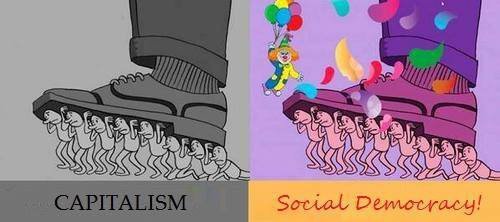DESIBUZZCanada
Events Listings
Dummy Post

International Day Of Yoga To Be Virtually Celebrated Saturday At 4pm

CANCELLED: Coronavirus Fears Kills Surrey’s Vaisakhi Day Parade

ADVERTISE WITH US: DESIBUZZCanada Is The Most Read South Asian Publication Online

SURREY LIBRARIES: Get Technology Help At Surrey Libraries

WALLY OPPAL: Surrey Police Transition Update On Feb. 26

GONE ARE THE DAYS - Feature Documentary Trailer

Technology Help At Surrey Libraries

Birding Walks

Plea Poetry/short Story : Youth Contest

International Folk Dancing Drop-in Sessions
OPINION: Why Social Democracy Beats Capitalism Hands Down
- April 16, 2025

By Alex Sangha
In an era of rising inequality, unaffordable healthcare, and political disillusionment, it's fair to ask: What kind of economic and political system actually delivers a good life for the average person? While capitalism—particularly the American model—is often praised for its entrepreneurial freedom and dynamism, the reality is that it works far better for the few than the many. When we look at the data, it's clear that social democracy, as practiced in Scandinavian countries like Norway, Sweden, and Denmark, consistently delivers higher quality of life for the poor, working, and middle classes.
Let's start with health. Life expectancy in the United States is around 76 years, while in Norway, Sweden, and Denmark, it ranges between 82 and 84 years. That gap is not an accident. Scandinavians enjoy universal healthcare, meaning no one goes bankrupt because they got sick or lost their job. In the U.S., nearly 27 million people remain uninsured, and medical bills are the number one cause of personal bankruptcy. Infant mortality is another telling measure: In the U.S., 5.4 infants die per 1,000 live births—more than double the rates in Scandinavia, which average around 2 deaths per 1,000 births.
Education tells a similar story. While Americans can pay tens of thousands of dollars a year for college and graduate saddled with an average of $30,000 in student debt, most Scandinavian countries offer free or low-cost post-secondary education. Access to education there is based on merit and public investment—not personal wealth. As a result, young people can build futures without being buried in debt before they even start.

And then there's parental leave. The United States remains the only wealthy country in the world with no guaranteed paid parental leave. In contrast, Sweden offers up to 480 days of paid leave, shared between both parents. Denmark provides 52 weeks, and Norway, about 49 weeks at full pay. These policies allow families to bond and recover from childbirth without sacrificing their income or careers.
Social mobility—a key promise of the American dream—is no longer a U.S. strength. A child born into a low-income family in the U.S. has a much harder time moving up the economic ladder than their counterparts in Scandinavia. The U.S. ranks lower than Denmark, Norway, and Sweden in intergenerational mobility, according to the OECD. In other words, where you're born in America has an outsized effect on where you end up.
Scandinavian countries also have lower poverty rates. While about 11–12% of Americans live below the poverty line, that figure is typically 6–8% in Sweden, Norway, and Denmark. Wealth and income inequality are also far more extreme in the U.S., where the Gini coefficient (a measure of inequality) sits at around 0.41, compared to 0.25 to 0.29 in the Nordic countries. This isn't just about envy or fairness—it's about stability. Societies with lower inequality are healthier, safer, and more cohesive.
Critics often cite taxes as a downside to social democracy. Yes, taxes are higher in Scandinavia, but the return on investment is massive. Citizens receive cradle-to-grave public services: healthcare, education, childcare, eldercare, job retraining, and more. People don't have to stress about whether they can afford to see a doctor, pay for daycare, or retire with dignity.

And perhaps most importantly, people are happier. According to the 2024 World Happiness Report, Finland, Denmark, and Iceland claimed the top three spots, with Sweden and Norway also in the top ten. The United States ranked 23rd. These rankings are based on income, health, freedom, social support, and trust in institutions—areas where social democracies consistently excel.
American-style capitalism can generate staggering wealth, but too much of that wealth ends up concentrated in the hands of a few. Meanwhile, millions struggle with debt, lack of healthcare, housing insecurity, and job instability. The freedom to start a business or make a fortune exists—but so does the ever-present fear of falling through the cracks.
Scandinavian social democracy doesn't reject capitalism—it harnesses it for the common good. Markets still operate, innovation still thrives, and businesses still profit. But strong regulations, labor protections, and a commitment to universal services ensure that prosperity is shared, not hoarded.
No system is perfect. But if we measure success not just by GDP or stock market gains, but by how well a society supports its people, social democracy is winning. The data is there. The model is proven. It's time we stop treating it like a utopian fantasy—and start seeing it as a blueprint for a fairer, freer, and more fulfilling life.

Alex Sangha is a Surrey-based activist and writer.











